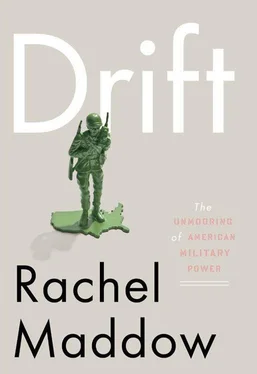We were a country that could afford to be generous to our returning veterans, and more than sixty years later we’re still reaping the benefits of that generosity. The post–World War II GI Bill assured returning vets a year’s worth of wages whether they worked or not, and paid college tuition and a living stipend, too. Nearly half of the male students on college campuses in 1948 had been to war. And it also offered low-interest government-guaranteed loans for buying a home. Housing construction and manufacturing boomed. The curve of GNP, household income, and personal spending trended up, up, and up.
The United States of America was a robust nation—a nation of means—and we rebuilt and reconfigured our institutions after World War II in a way that reflected this. Yes, the military demobilization after the war was massive and fast, but even the dramatically shrunk-down US military of 1950 was three times the size it had been before World War II—and with a big footprint. The US soldiers, sailors, airmen, and Marines, right alongside all those consumer goods, were already leading exports. We had 150,000 troops in the Far East, 125,000 in Western Europe, and a smattering in such diverse and far-flung locations as Panama, Cuba, Guatemala, Morocco, Eritrea, Libya, Saudi Arabia, Samoa, and Indochina. Wary as never before of the Communist threat—now a constant “speck of war visible in our horizon”—America had come to see Jefferson’s preoccupation with standing armies and threats from inside our own power structure as a bit moldy. We were, after all, the only country still capable of keeping the planet safe for democracy.
Through the fifteen years that followed World War II, we trusted our commanders in chief—Truman, Eisenhower, Kennedy, they’d all served!—to project our military power in measured and meaningful ways. We ratcheted up our extraordinary nuclear program, broke a Soviet blockade of Berlin with a dramatic airlift, beat the Commies back in Formosa and Thailand, fought them to a standstill in Korea, and stared down Khrushchev when our spy planes caught him red-handed putting missiles in Cuba. When President Kennedy decided to engage the Soviets in the space race, the nation’s finest military pilots were the chosen first team.
The United States military was an institution of unsurpassed public esteem, top to bottom. You could measure that regard in a hundred different ways. Take, for instance, the plaything metric. In 1964 one of the hottest new toys on the market was a doll, for boys: G.I. Joe.
There was not a whiff of peacetime, soon-to-be civilian in this toy; these were not Ken dolls in dress uniforms at the debutante ball. G.I. Joe was olive drab, M1 rifle, canned Spam, scar-faced, down-and-dirty. The hard-plastic soldiers (petroleum-based all the way) were built to take a pounding. In the spring of 1965, in GI Bill–built suburbs from Levittown, New York, to Castro Valley, California, ten-year-old boys were digging miniature foxholes and jerry-rigging Dad’s old handkerchiefs to make paratroopers out of their new dolls. Hasbro had an instant hit; G.I. Joe did close to $20 million in sales that first year. Early indications pointed to steady growth.
But sales reports later in the ’60s made for unhappy reading in the Hasbro boardroom, and by the early 1970s the toy company found itself leaning on gimmicks to sell G.I. Joe. These included fuzzy flocked hair (they called it “realistic”), a nonregulation beard, colorful new uniform choices, swiveling “Eagle-Eyes,” and a fighting hand formed into a “Kung Fu Grip” (Bruce Lee had taken off by then). Hasbro folded G.I. Joe into “The Adventure Team… ready to go wherever adventure leads.” The company was at pains to minimize the militaryness of its military doll.
You can’t blame the Hasbro marketers and their sell-side analysts for having been optimistic in those first heady months of 1964. They were sure they were riding the long wave of good feeling for US soldierdom. How could they have known that the ground under G.I. Joe was beginning to shift, even in the happy springtime of his advent?
The first tectonic tremor came from the White House in the early months of 1965 when President Lyndon Baines Johnson began the prosecution of his own hot war in Vietnam. He had campaigned in ’64 by promising, “We are not about to send American boys nine or ten thousand miles away from home to do what Asian boys ought to be doing for themselves.” He’d painted his Republican opponent, Barry Goldwater, as a dangerous hair-trigger warmonger (with some help from Goldwater himself, who, in a May 1963 ABC interview, proposed dropping low-yield nuclear bombs on Vietnam to destroy supply lines and achieve “defoliation of the forests.” And why not? Among their many-splendored uses, nuclear explosions can be excellent pruners).
Yes, in 1961, Johnson’s predecessor John F. Kennedy had promised at his inauguration, “We shall pay any price, bear any burden, meet any hardship, support any friend, oppose any foe, to assure the survival and the success of liberty.” But Johnson’s promise was not Kennedy’s; Johnson promised to resist the expensive temptations of foreign wars and to build a Great Society at home instead. He promised not to escalate in Vietnam. He promised he would not allow the United States to get “tied down in a land war in Asia.” But then, despite the promises, despite his determination not to, Johnson got dragged to the conclusion that the United States needed to be fighting in Vietnam. He moved to convince the American people and Congress that he should have the authority to use military force there—the wildly exaggerated Gulf of Tonkin incident in 1964 would be the basis for the only congressional authorization Johnson ever sought for war. Then, with only halfhearted gestures toward trying to keep the country on board with a war he never really wanted to fight, Johnson set about trying to fight his war in a way the American people might hopefully not notice too much. “We don’t think we’ll ask for much money,” Johnson confided to the chairman of the Senate Armed Services Committee, Richard Russell, in the summer of 1965, as he made plans to increase the ground forces in Vietnam from 80,000 to 180,000, “because we don’t want to blow this thing up.”
LBJ “tried to fight a war on the cheap,” one of the Johnson administration’s key intelligence men, George A. Carver, would say years later, “and tried to fight a war without acknowledging that he was fighting a war.”
The agonized president was trying to thread a new and difficult needle: taking the nation’s armed forces to war without taking the nation as a whole to war. And central to that effort was one crucial decision. Against the advice of his secretary of defense and the Joint Chiefs of Staff, over the outright objection of the chief of staff of the US Army, Johnson simply refused to call up the modern parallel to those old Jeffersonian state militias, all those men living in our neighborhoods: the US Army Reserve and the National Guard. The Guard or Reserves had been called to fight in every American war in the nation’s history—even in the nonwar that was the Cuban Missile Crisis in 1963—but in Vietnam, Johnson hesitated. In part he was worried that a full-scale mobilization would draw the Russians and the Chinese into the war, but mostly he didn’t want to get Congress and the rest of the country all het up and asking too many questions.
“I don’t think I’ll have to call [the Reserves] up now,” he told Russell. “I think it’s too dramatic. I think it commits me where I can’t get out. And it puts me out there further than I wanna get right at the moment…. You don’t think I oughta have a joint session, do you?”
“Not as long as you don’t call up any Reserves and all I wouldn’t,” Russell answered. The six-term senator from Georgia was sympathetic to the president’s predicament. (“I never worked on anything as hard in my life,” Johnson complained to the man who had been his mentor and champion in the Senate.)
Читать дальше












